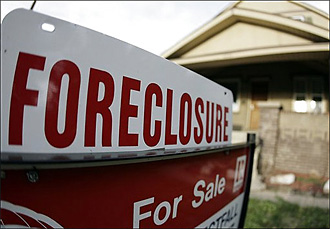 |
 |
 |
 News from Around the Americas | December 2007 News from Around the Americas | December 2007  
Bush Wins Agreement To Freeze Mortgages
 David Cho & Neil Irwin - Washington Post David Cho & Neil Irwin - Washington Post
go to original


| | A foreclosure sign tops a sale sign outside an existing home on the market in northwest Denver in this Aug. 29, 2007 file photo. The Bush administration has hammered out an agreement with industry to freeze interest rates for certain subprime mortgages for five years in an effort to combat a soaring tide of foreclosures, congressional aides said. (Associated Press) |
President Bush will announce this afternoon an agreement with major mortgage firms to freeze interest rates for five years for financially troubled homeowners - a plan advocates say will help forestall a major foreclosure crisis but some conservatives say amounts to a bailout of people who made bad financial decisions.

The plan would apply to homeowners who got adjustable-rate subprime mortgages between Jan. 1, 2005, and July 31 of this year and are facing a sharp jump in their rates before July 31, 2010. It would also offer to put them on a fast track to refinance their mortgages through lenders or through state and local housing authorities, according to several people briefed on the matter who spoke on condition of anonymity because the deal has not been officially announced.

Eligible homeowners are those with enough income to pay their mortgages at lower rates but not so wealthy that they could afford the increase in monthly payments. The plan would be offered only to people who live in their homes, an effort to exclude real estate investors and speculators.

On Capitol Hill yesterday, some Republican lawmakers and their aides expressed concern that the plan would anger homeowners and others who stayed out of the subprime mortgage mess.

Darren McKinney, 48, a renter in the District, said he has been waiting for housing prices to fall so he can buy a condo without resorting to a dubious loan. He turned down an opportunity to buy his 600-square-foot apartment for $310,000 in late 2004 because he thought it was "absurdly overpriced."

Now the government is rewarding people who made irresponsible decisions and bought homes beyond their means, he said.

"There are those of us who purposely sat on the sidelines during the course of the last three years while the senseless frenzy was going on, and we presumed the free market would be allowed to correct itself," McKinney said. "The government is now meddling in the market and looking to prop up lenders and borrowers alike, and those of us who wisely bided our time get screwed."

Others said the government needs to help financially troubled homeowners to prevent the mortgage mess from taking down the broader economy.

"Very large losses have already happened," said Alex J. Pollock, a resident fellow at the American Enterprise Institute, a conservative Washington think tank. "We can't somehow stop them from happening because they've already happened. You need to go through an adjustment and a repricing." Pollack said whether the new plan makes sense depends on its details.

The mortgage crisis erupted this year after declining housing prices triggered near-record delinquencies and foreclosures around the country. The impact roiled Wall Street as the value of securities backed by these mortgages plummeted, damaging earnings at major financial institutions. Lending, which had boomed for years, ground to a halt.

Several efforts by Congress to ease the crisis have stalled in committee. Yesterday, lawmakers expressed concern over the accountability of nonprofit groups that would receive public funds under the administration's plan. Some taxpayer money - about $200 million - would go to nonprofit groups staffing a national credit-counseling hotline for troubled homeowners. Some Republicans worried that about the expanding role of local housing authorities, which can be difficult to police.

But it appears no tax dollars will be used to subsidize the freeze on interest rates. That cost would be borne primarily by lenders and investors, and by homeowners who may have to pay a fee to modify their loans. The details will be released today.

The administration's plan appears to be winning support on both sides of the aisle. And perhaps as importantly, it has backing from key private-sector players, including nonprofit groups, mortgage lenders such as Countrywide Financial and big banks such as Citigroup. The five-year freeze represents a compromise among banking regulators, who wanted it to last seven years, and mortgage firms and banks, which argued it should be one or two years.

An analyst at the Competitive Enterprise Institute, a conservative think tank, said Bush's plan is bad policy.

"In some ways it's worse than a taxpayer bailout," said John Berlau, director of the Center for Entrepreneurship at the institute. "It pressures an industry to essentially alter the terms of millions of contracts, and it's going to make investors think twice about investing in America again."

Others, including Sen. Hillary Rodham Clinton (D-N.Y.), criticized the plan for not going far enough. Yesterday, the Democratic presidential candidate called for a moratorium of at least 90 days on subprime mortgage borrowers facing foreclosure and a five-year rate freeze on all subprime loans.

"Although the administration is finally giving the foreclosure crisis the attention it deserves, it seems that President Bush is going to give struggling homeowners far less than they need," Clinton said in a statement.

On Tuesday, Treasury Secretary Henry M. Paulson Jr. endorsed another plan at a briefing with members of the Senate Finance Committee that would temporarily let government-chartered Fannie Mae and Freddie Mac insure mortgages above their current limit. This would allow home buyers to get loans higher than $417,000 without paying higher "jumbo" rates, according to people at the briefing.

Paulson wants to tie this action to a broader overhaul of Fannie and Freddie, said Jennifer Zuccarelli, a Treasury spokeswoman. | 
 | |
 |



